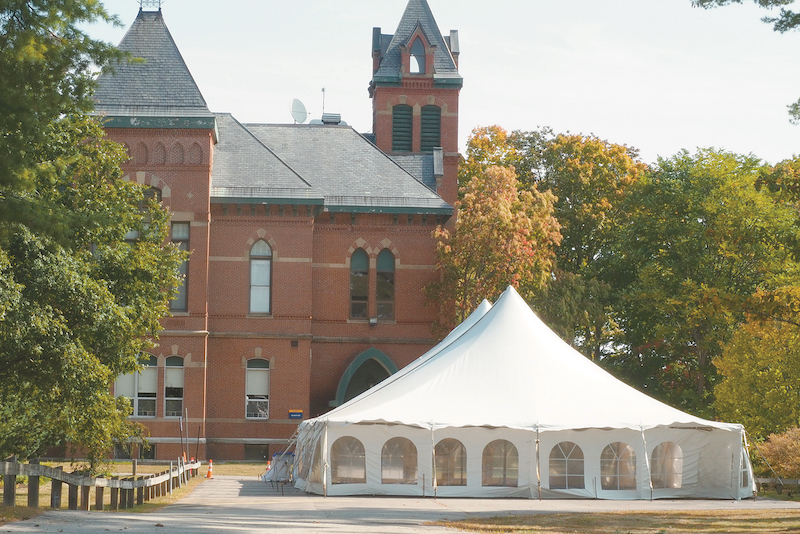Visits to USM’s campuses in Gorham and Portland by the general public are currently not allowed. But if a hypothetical member of the public were to drive through USM’s Gorham campus, one of the first things they would notice would be the three large white tents placed around the campus. There is also one on the Portland campus behind Payson Smith Hall. These tents are intended as places where students can congregate or socially isolate before, during, and after classes, in a safer manner than traditional indoor settings. There are designated places in the tents where students can sit while accessing Wi-Fi, taking part in after-class discussions, or participating in meetings of clubs and other student organizations.
Anyone driving through the campus might not notice all of the significant improvements that have taken place since the spring 2020 semester. The parking lot would still appear full, as total USM student enrollment has actually increased slightly. Full time enrollment was 1,223 as of the first day of classes, although the number of students in Gorham residence halls was down to 728, a number that is below capacity. If a visitor happened to see any students exiting or entering their vehicles, they would be wearing masks, as all persons on the campus are required to do at all times. The only exceptions are for those inside a vehicle or inside their own dorm room.
Some less noticeable but equally important improvements are measures like frequent COVID-19 testing. Approximately 2,000 asymptomatic members of the University of Maine on-campus community are tested every 10 days, which has increased the state-wide level of testing. (Specific percentages for the number of students and staff being tested at USM’s campuses are not yet available.) In addition, the University of Maine is using wastewater testing to monitor possible COVID-19 levels at USM’s Gorham dormitories, as well as at dormitories in Orono and Farmington.
From mid-August through early September, the University system conducted more than 14,000 arrival tests on asymptomatic students and staff members. These tests resulted in 14 individual cases being identified system-wide—including four at USM— with all affected persons being placed in CDC isolation status. Thirteen have since emerged from isolation status. As of September 23, the number of COVID-19 cases within the University of Maine system statewide is at one (located at USM).

Three large tents have been placed around the USM campus for students to congregate or socially isolate in a safe manner.
Anyone within a residence hall is required to wear a face-covering over his/her nose and mouth when in public spaces. This includes laundry rooms, hallways and the main lobby. The university is encouraging students to stay on campus, to reduce the chance of exposing the USM residential community to COVID-19.
In the event that a student is found to have COVID-19, the university will notify everyone in the residence and all other close contacts. At least for the first month of the semester, students are not allowed to have guests or visitors on the campus. The University administration has made it clear that attending or hosting a party or function that exceeds Maine’s group-size limitations may be deemed a violation of the student code for endangering public health and safety. Students who host or promote prohibited events at any venue, including private residences, may face suspension or dismissal.
For students in isolation status, there is a case-by-case approach regarding where they should isolate. Many students are from nearby towns in southern Maine, and USM would prefer them to go to their family home if convenient. However, the university understands that other students live farther away or feel they have no appropriate place to go to, so the university has a plan for such students to isolate on campus.
Seating capacities in all USM dining locations have been reduced to assist students in following the six-foot social distancing rule. Dining at USM this semester now includes many pre-packaged items. Students are encouraged to take their food back to their room with them or order ahead for pick up as much as possible, in order to limit the number of students and staff in the dining room at any given time. All dining locations have implemented enhanced cleaning techniques. Social distancing is emphasized, foot traffic patterns are clearly identified, and barriers are in place to separate employees from dining hall guests.
The University is encouraging students to stay on campus every weekend, and to especially avoid traveling out of state. To help with this plan, the administration has canceled a day off from classes that had been planned for October 13. However, October 12 is still a University-wide holiday for Indigenous Peoples Day. USM spokesperson Daniel Hartill stated, “A lot of people are working very, very hard to ensure the safety of our students and staff.”
Another protective measure involves transitioning away from face to face instruction for the last few weeks of the fall semester. Students will leave for Thanksgiving break, which begins Friday, November 20, and the remainder of the semester will be conducted entirely online. This includes classes, meetings, exams, and student contact with instructors.
All intercollegiate sports were cancelled for the fall sports season. Many teams are still practicing under limited conditions. Many safety and hygiene measures have been put in place at the Costello Sport Complex. Currently, only USM students, faculty and staff may use the facilities. None of USM’s sports and fitness facilities are open to the general public currently. University staff will continue to evaluate these closures in the coming weeks and months. USM administrators will continue discussions with various stakeholders before deciding if play can be resumed this winter.

